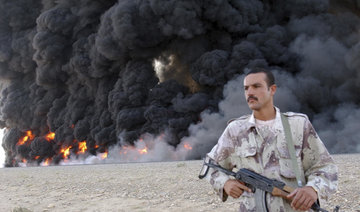ISLAMABAD: Pakistan has hired a French law firm to explore ways of avoiding being hit with a multi-billion-dollar bill for failure to complete its side of a gas pipeline project with sanctions-hit Iran.
Legal experts have been called in to look at options to deal with an Iranian threat to bring international court action against Islamabad over missed construction deadlines and see if the project can be completed without attracting US sanctions, a top official at the Pakistani Ministry of Energy said on Tuesday.
The Americans have steadfastly opposed Pakistan’s involvement in the $7 billion (SR26 billion) project, saying it violates sanctions against Iran.
Under an agreement signed between the two countries in 2009, the pipeline project should have been completed by December 2014, delivering 21.5 million cubic meters (760,000 million cubic feet) of gas per day to Pakistan.
It was to have been constructed using a segmented approach, with Iran laying down the pipeline on its side and Pakistan on its territory.
Tehran formally issued a notice to Islamabad in February this year, saying it was moving an arbitration court against Pakistan for failing to lay down the pipeline in Pakistani territory within the timeframe stipulated in the bilateral agreement. Since then, Pakistan has been exploring different legal and diplomatic options to avoid the litigation.
“We are analyzing the overall international situation regarding Iran and studying Tehran’s position over the gas pipeline project through an international law firm,” Sher Afgan Khan, additional secretary at the Ministry of Energy, told Arab News.
Pakistan has hired the French law firm, Gide Loyrette Nouel, to study the deal and prepare a legal response to Iran’s position that the US sanctions do not impact its gas import trade.
In May this year, Pakistan had informed Iran in writing that it could not execute the project while Tehran was under a US sanctions regime.
“We are trying our best not to violate (the US) sanctions … we are already on the FATF’s [Financial Action Task Force] grey list,” Khan said, referring to Pakistan’s formal placement on the intergovernmental organization’s list in June last year.
American President Donald Trump’s administration has warned countries around the world to stop buying Iranian oil or face sanctions of their own. Washington’s European allies have tried and failed to come up with ways to blunt the economic impact of the US move. The US sanctions against Iran are a major hindrance for most gas pipeline projects in the region.
But Pakistan is caught in a catch-22 situation over the deal. Under a penalty clause, Pakistan is bound to pay $1 million per day to Iran from Jan. 1, 2015, for failing to build its part of the pipeline. If Iran takes the case to an arbitration court, Pakistan will likely to have to pay billions of dollars as a penalty.
Arab News has learned that the penalty clause of the agreement is due to expire in December this year, hence why Iran was threatening Pakistan to move the international court before its expiry.
“We may agree to extend the addendum (pertaining to the penalty clause) for a period of another five years to allay concerns of Iran, but only if advised so by the legal firm,” a senior ministry official told Arab News.
Khan said that Iran “understands our position and negotiations are in progress to settle the issue amicably.”
On a deadline for completion of the legal consultation process with the French law firm, he said: “It is not very extensive and is expected to be completed soon.”
Pakistan hires top law firm to avoid multi-billion-dollar penalty over stalled gas pipeline project with Iran
Pakistan hires top law firm to avoid multi-billion-dollar penalty over stalled gas pipeline project with Iran

- US steadfastly opposes Pakistan’s involvement in the $7 billion project
- Pakistan is caught in a catch-22 situation over the deal













